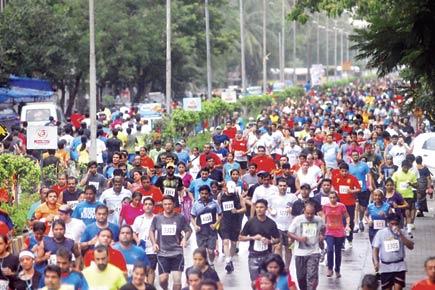Following the death of a Mumbaikar while running a marathon in the city on Sunday, mid-day asks experts how runners can prepare for long distance races while ensuring it doesn’t take a toll on their health

'Don’t neglect symptoms of health issues'
Running the marathon is a difficult challenge and puts enormous load on the body and the heart, in particular. During the run, the heart rate, systolic blood pressure as well as the heart pumping efficiency go up remarkably.
ADVERTISEMENT
Also read: Man dies while running marathon in Borivali

Dr Robin Pinto
However, with the right training, preparation and application it is often possible for amateurs to aspire to and achieve success. Here’s a handy guide for anyone wanting to start long distance running:
>> Always remember to gradually build up one’s stamina. One should start slowly and increase the workout in a phased manner. Rome was not built in a day!
>> It is preferable (especially if older than 40 years) to undergo an ECG and thorough physical examination prior to undertaking a marathon.
>> If your doctor suspects an underlying cardiac problem and is not satisfied with the ECG and physical examination, or if there is strong family history of sudden cardiac death, one should undergo a 2D Echo and Stress test prior to training.
Also Read: Runner dies at Brighton Marathon

Over 10,000 people took to the roads to run the marathon in Borivli on Sunday. The event took a tragic turn after a 43-year-old runner collapsed before he could finish the race. Pic/Sameer Markande
>> Once training begins, be on the lookout for and do not neglect symptoms such as undue breathlessness even on mild exertion, light-headedness and chest pain and heaviness.
>> If there is a very strong family history of, or one is suffering from numerous risk factors such as hypertension/ diabetes/ increased cholesterol, it is advisable to undergo a CT coronary angiography in addition.
>> Remember, all casualties during the marathon may not be due to blockage of the arteries but due to other abnormalities affecting the muscle of the heart.
>> It is essential to have an ambulance on hand with equipment to enable resuscitation of the runner, if need be. A defibrillator, especially, is needed to deliver a shock to restore a chaotic electrical rhythm, which is the commonest cause of sudden death. - Dr Robin Pinto is a cardiologst
'Don’t over exert yourself; know your limits'
While marathons help raise awareness about various causes, marathoners themselves need to be made aware of certain factors as well, such as the preparations that must go into the race.
“Most accidents happen because we are not prepared; not just the participants but the organisers too. They should have mandatory check-ups for people who sign up.

Trainer Praveen Tokas
Remedial medicines and an ambulance at hand should also be compulsory. The onus should be on the organisers too, to be equipped to handle an event,” said strength and conditioning trainer, Praveen Tokas.
The celebrity trainer lists a few basic tips to keep marathoners in running shape:
>> Do not sign up if you are not prepared.
>> Consulting a doctor before you sign up for the marathon is a good preventive measure. A lipid profile blood test can gauge your cardio-vascular health.
>> It is known that smaller marathons see more people getting injured, as participants try and push themselves keeping the short distance in mind. Don’t over exert yourself; know your limits.
>> Prepare for your marathon three to four months in advance, with the help of a trainer.
>> Have the right amount of water to keep you hydrated to avoid a heat stroke. Over intake of water is dangerous too.
>> Drink one cup of water, two to three hours before a marathon, and one cup just before. Drink eight ounces (one cup) of water every 15 to 20 minutes. Sip on your water and don’t gulp it. One can also have energy drinks with 4 to 6% carbohydrate content.
Also read: Over 10000 run marathon at Borivali
>> Reduce your volume of training two to three days before the marathon to let your body recuperate.
>> Carry salt packs, or the organisers should keep salt packs, as salt helps you hold water. Organisers should also keep ice packs and ice towels ready.
>> Two weeks before the race, try visiting the route and get familiar with the uphills and the general geography.
Praveen Tokas is a strength and conditioning expert and celebrity fitness expert
- As told to Dhara Vora
 Subscribe today by clicking the link and stay updated with the latest news!" Click here!
Subscribe today by clicking the link and stay updated with the latest news!" Click here!






